(完整版)高中英语情态动词讲解与练习(含答案),推荐文档
(英语)高中英语情态动词解题技巧讲解及练习题(含答案)
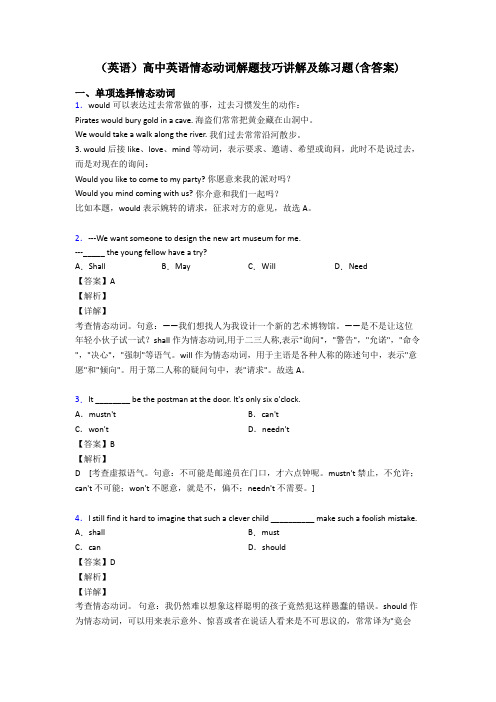
(英语)高中英语情态动词解题技巧讲解及练习题(含答案)一、单项选择情态动词1.would可以表达过去常常做的事,过去习惯发生的动作:Pirates would bury gold in a cave. 海盗们常常把黄金藏在山洞中。
We would take a walk along the river. 我们过去常常沿河散步。
3. would后接like、love、mind等动词,表示要求、邀请、希望或询问,此时不是说过去,而是对现在的询问:Would you like to come to my party? 你愿意来我的派对吗?Would you mind coming with us? 你介意和我们一起吗?比如本题,would 表示婉转的请求,征求对方的意见,故选A。
2.---We want someone to design the new art museum for me.---_____ the young fellow have a try?A.Shall B.May C.Will D.Need【答案】A【解析】【详解】考查情态动词。
句意:——我们想找人为我设计一个新的艺术博物馆。
——是不是让这位年轻小伙子试一试?shall作为情态动词,用于二三人称,表示"询问","警告","允诺","命令","决心","强制"等语气。
will作为情态动词,用于主语是各种人称的陈述句中,表示"意愿"和"倾向"。
用于第二人称的疑问句中,表"请求"。
故选A。
3.It ________ be the postman at the door. It's only six o'clock.A.mustn't B.can'tC.won't D.needn't【答案】B【解析】D[考查虚拟语气。
高中英语情态动词技巧(很有用)及练习题含解析
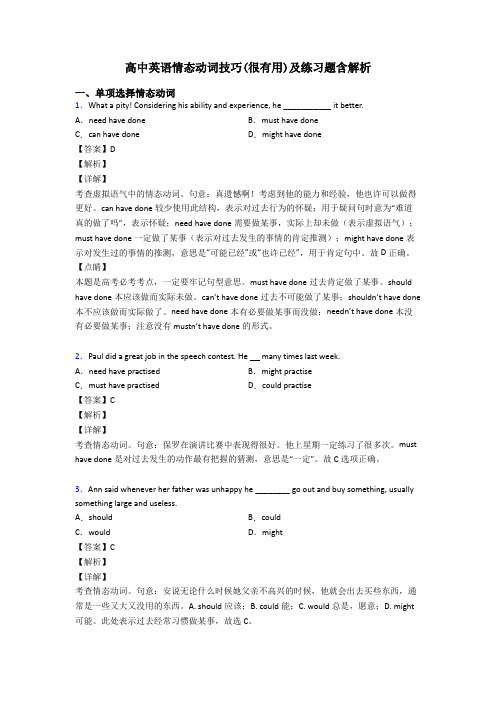
高中英语情态动词技巧(很有用)及练习题含解析一、单项选择情态动词1.What a pity! Considering his ability and experience, he ___________ it better.A.need have done B.must have doneC.can have done D.might have done【答案】D【解析】【详解】考查虚拟语气中的情态动词。
句意:真遗憾啊!考虑到他的能力和经验,他也许可以做得更好。
can have done较少使用此结构,表示对过去行为的怀疑;用于疑问句时意为“难道真的做了吗”,表示怀疑;need have done需要做某事,实际上却未做(表示虚拟语气);must have done一定做了某事(表示对过去发生的事情的肯定推测);might have done表示对发生过的事情的推测,意思是“可能已经”或“也许已经”,用于肯定句中。
故D正确。
【点睛】本题是高考必考考点,一定要牢记句型意思。
must have done过去肯定做了某事。
should have done本应该做而实际未做。
can’t have done过去不可能做了某事;shouldn’t have done 本不应该做而实际做了。
need have done本有必要做某事而没做;needn’t have done本没有必要做某事;注意没有mustn’t have done的形式。
2.Paul did a great job in the speech contest. He many times last week.A.need have practised B.might practiseC.must have practised D.could practise【答案】C【解析】【详解】考查情态动词。
句意:保罗在演讲比赛中表现得很好。
他上星期一定练习了很多次。
(英语)高一英语情态动词解题技巧及练习题(含答案)

(含答案)一、单项选择情态动词1.—It ’ s so hot and uncomfortable here! Why are your windows still closed? —Oh, I ’ m not to blame. They ___ open.A. shan ’t B. mustn ’t C. won ’t D . wouldn ’t【答案】C【解析】【详解】考查情态动词辨析。
句意:---这里又热又不舒服!你的窗户怎么还关着?---哦,不该责备我啊。
窗户打不开了。
shan' t= shall no意为不可,不应";mustn' t=must not意为不要”;wouldn't=would not意为不会,不愿意"。
won' t=will not意为不会,不能“,will在这里表示能力、功能。
例如:This auditorium will seat one thousand people. 这个礼堂能容纳一千人。
这句话意思是“这扇窗不能打开” ,故选 C 项。
2.—What ’ s wrong with you?—Oh, I am sick. I __ so much ice cream just now.A.shouldn ’ t eat B.mustn ’ t eatC.couldn ’ t have eaten D.shouldn ’ t have eaten【答案】D【解析】【详解】考查情态动词和虚拟语气。
句意:——你怎么了?——我生病了,我刚才不应该吃那么多冰激凌。
A. shouldn ' t eat应该吃;B. mustn' t e豢止吃;C. couldn ' t have eaten可能吃;D. shouldn ’ t heaveaten 本来不应该吃。
根据just now 可知,是发生在过去,故选D。
【英语】高中英语情态动词技巧和方法完整版及练习题及解析

【英语】高中英语情态动词技巧和方法完整版及练习题及解析一、单项选择情态动词1.It has been announced that all the students ________ put on masks before going to school in case they are infected with SARS virus.A.shall B.will C.need D.may【答案】A【解析】【详解】【详解】考查情态动词。
句意:所有学生们应在去学校之前带上口罩以防感染非典病毒,这已经被宣布。
shall用于第二、第三人称,表示说话人给对方命令、警告、允诺或威胁,故选A 项。
2.Look! There are so many mistakes in your composition. You ________ have fixed full attention on it.A.can B.shouldC.need D.might【答案】B【解析】【详解】考查情态动词。
句意:看!你的作文里有那么多的错误。
你本应该把所有的注意力都集中在它上面的。
表示“本应该做但实际上没有做”应该用should have done结构,can have done 表示可能;need表示需要;might have done表示可能做过某事;故选B。
3.Using AI, many companies are now conducting experiments that__________ possible just a few years ago.A.would have been B.might have beenC.shouldn't have been D.couldn't have been【答案】D【解析】【详解】考查情态动词表推测。
句意:很多公司现在使用人工智能进行试验,这在几年前是不可能的。
高考英语高中英语情态动词解题技巧和训练方法及练习题(含答案)

高考英语高中英语情态动词解题技巧和训练方法及练习题(含答案)一、单项选择情态动词1.Mark ______ have hurried. After driving at top speed, he arrived half an hour early. A.needn’t B.wouldn’t C.mustn’t D.couldn’t【答案】A【解析】考查情态动词。
need’t have done 本不必要做某事,句意:迈克本不必要着急的。
他以全速驾驶后,他早到了半个小时。
wouldn’t不会,mustn’t禁止,couldn’t不可能,所以选A。
2.While it wasn’t the goal of the trip, I was rewarded with fresh insights, ones that ________ to me during the regular course of business.A.might never happen B.could never have happenedC.should not happen D.needn’t have ha ppened【答案】B【解析】【详解】考查虚拟语气。
句意:虽然这并不是这次旅行的目的,但我得到了一些新的领悟,那些领悟在我的日常生活中是本不可能发生的。
此处考查虚拟语气,“我得到新的领悟”发生在过去,故此处是与过去事实相反,应用could/might/would/need/should+have done,“本不可能发生”是could never have happened,故选B项。
【点睛】本题考查“情态动词+have done”的虚拟语气,其常用表达有:could have done本能做某事而未做couldn’t have done不可能做了某事should have done本应该做某事而未做shouldn’t have done本不应该做某事而做了would have done本会某事而未做wouldn’t have done本不会做某事而做了need have done本需要做某事而未做needn’t have done本不必要做某事而做了3.According to a newly released regulation on online video services, no one _____ generate, release or spread fake news or information by using such technologies.A.can B.shall C.will D.may【答案】B【解析】【详解】考查情态动词。
高中英语情态动词经典习题(含答案)
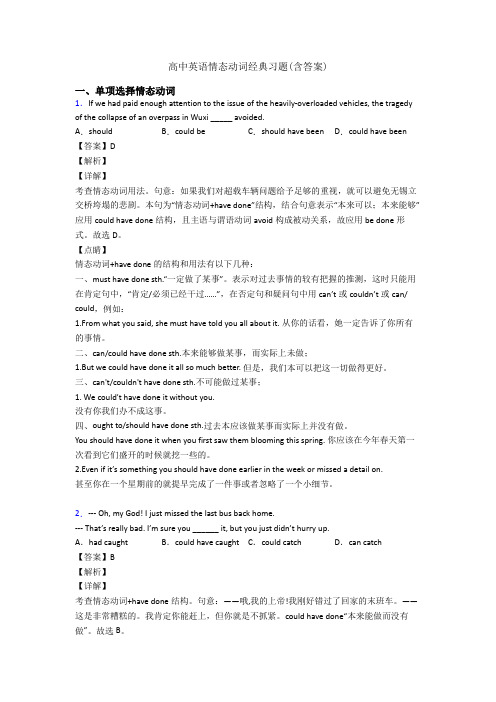
高中英语情态动词经典习题(含答案)一、单项选择情态动词1.If we had paid enough attention to the issue of the heavily-overloaded vehicles, the tragedy of the collapse of an overpass in Wuxi _____ avoided.A.should B.could be C.should have been D.could have been 【答案】D【解析】【详解】考查情态动词用法。
句意:如果我们对超载车辆问题给予足够的重视,就可以避免无锡立交桥垮塌的悲剧。
本句为“情态动词+have done”结构,结合句意表示“本来可以;本来能够”应用could have done结构,且主语与谓语动词avoid构成被动关系,故应用be done形式。
故选D。
【点睛】情态动词+have done的结构和用法有以下几种:一、must have done sth.“一定做了某事”。
表示对过去事情的较有把握的推测,这时只能用在肯定句中,“肯定/必须已经干过……”,在否定句和疑问句中用can’t或couldn’t或can/ could,例如:1.From what you said, she must have told you all about it. 从你的话看,她一定告诉了你所有的事情。
二、can/could have done sth.本来能够做某事,而实际上未做;1.But we could have done it all so much better. 但是,我们本可以把这一切做得更好。
三、can't/couldn't have done sth.不可能做过某事;1. We could't have done it without you.没有你我们办不成这事。
高考英语语法专题复习:情态动词 知识点讲解与练习题(含答案)

高考英语语法专题复习:情态动词知识点讲解与练习题情态动词框架图常见情态动词:can/could; will/would; shall/should; may/might; need;dare; must; ought to, have to情态动词基本用法:肯定形式-----情态动词+ 动词原形/ + be done/have done否定形式:情态动词+not+ 动词原形一. 情态动词的基本用法(1) can、be able to 和could①can和be able to都表示能力,意思上没多大区别。
但can只有现在和过去时(could),而be able to则有更多的形式。
但当成功地完成某一具体动作时,通常不用could而用was/were able to来表示。
这时was/were able to 相当于managed to,表示经过一番努力,终于能够完成某事。
例句:Can you use chopsticks?The wounded man still was able to get to the village and was saved in the end.②can和couldcan和could表示猜测,一般用于疑问句和否定句.例句:--Can the news be true?-It can’t be true.③表示请求、允许(表请求时,口语中常用could 代替can 使语气更委婉,回答时用can)例子:Can I go now ?-Could I come to see you tomorrow?----Yes, you can. (否定回答可用No, I’m afraid not.)④表示惊异、怀疑、不相信的态度(主要用于否定句、疑问句或感叹句中)例子:How can that be true? I can’t believe my eyes and ears.How could you be so careless.?⑤ can 的特殊用法Can but 只好can’t but 不得不can’t …too 再….也不为过,越..越好can not but do 表示“不得不/只好做”can’t help but do 没有办法只有做can’t chose but do 没有选择只能做can do nothing but do 只能做have no choice but to do 别无选择而只有例子:I can but wait.I can’t but wait.You can’t be too patient to the customers.(2) may/might①may/might表示可能,但may比might可能性大。
高中英语情态动词常见题型及答题技巧及练习题(含答案)及解析

高中英语情态动词常见题型及答题技巧及练习题(含答案)及解析一、单项选择情态动词1.I often felt troubled in my teens and my grandma ________ comfort me, saying “Life is like that, dear”.A.would B.might C.should D.must【答案】A【解析】【详解】考查情态动词。
句意:在我十几岁的时候,我经常感到烦恼,我的奶奶会安慰我说,“生活就是这样,亲爱的”。
此处是would+动词原形,表示“过去总是做某事”。
故选A。
2.—I feel a little nervous.—Take it easy. You __________ have difficulty passing the exam when you have prepared for it well.A.mustn’t B.needn’t C.may not D.shouldn’t【答案】D【解析】【详解】考查情态动词。
句意:——我觉得有点紧张。
——不要着急。
当你准备充分时,通过考试应该不会有困难。
A. mustn’t禁止,不允许;B. needn’t不必;C. may not可能不会;D. shouldn’t不应该。
结合句意可知答案为D。
3.—It’s already 11 o’clock , and he ______ have been here half an hour ago.—Maybe he got caught in the rain.A.must B.ought toC.may D.can【答案】B【解析】【详解】考查情态动词。
句意:已经11点了,他半小时前就该到了。
A. must have done必定做了…(表示对过去的推测);B. ought to have done 本应该做的;C. may have done可能已经做过某事;D. can have done本来可以做的(但没有做),根据题意,故选B。
高考英语情态动词语法专题训练及答案(完整版)
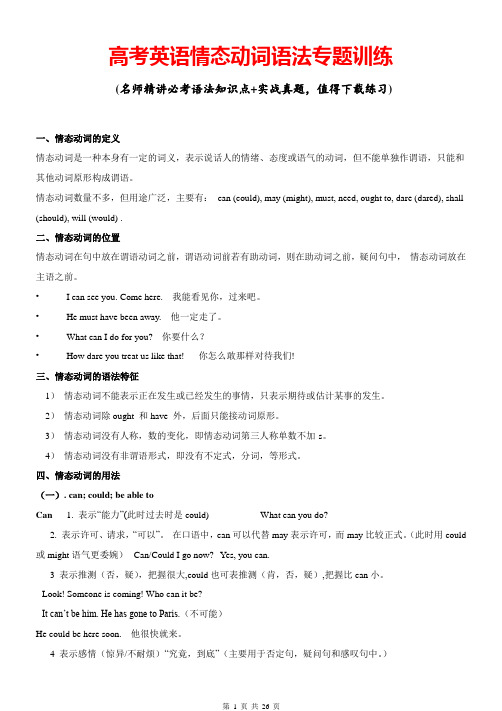
高考英语情态动词语法专题训练(名师精讲必考语法知识点+实战真题,值得下载练习)一、情态动词的定义情态动词是一种本身有一定的词义,表示说话人的情绪、态度或语气的动词,但不能单独作谓语,只能和其他动词原形构成谓语。
情态动词数量不多,但用途广泛,主要有:can (could), may (might), must, need, ought to, dare (dared), shall (should), will (would) .二、情态动词的位置情态动词在句中放在谓语动词之前,谓语动词前若有助动词,则在助动词之前,疑问句中,情态动词放在主语之前。
•I can see you. Come here. 我能看见你,过来吧。
•He must have been away. 他一定走了。
•What can I do for you? 你要什么?•How dare you treat us like that! 你怎么敢那样对待我们!三、情态动词的语法特征1)情态动词不能表示正在发生或已经发生的事情,只表示期待或估计某事的发生。
2)情态动词除ought 和have 外,后面只能接动词原形。
3)情态动词没有人称,数的变化,即情态动词第三人称单数不加-s。
4)情态动词没有非谓语形式,即没有不定式,分词,等形式。
四、情态动词的用法(一). can; could; be able toCan 1. 表示“能力”(此时过去时是could) What can you do?2. 表示许可、请求,“可以”。
在口语中,can可以代替may表示许可,而may比较正式。
(此时用could 或might语气更委婉)--Can/Could I go now?--Yes, you can.3 表示推测(否,疑),把握很大,could也可表推测(肯,否,疑),把握比can小。
--Look! Someone is coming! Who can it be?--It can’t be him. He has gone to Paris.(不可能)He could be here soon. 他很快就来。
【英语】高中英语情态动词解题技巧讲解及练习题(含答案)
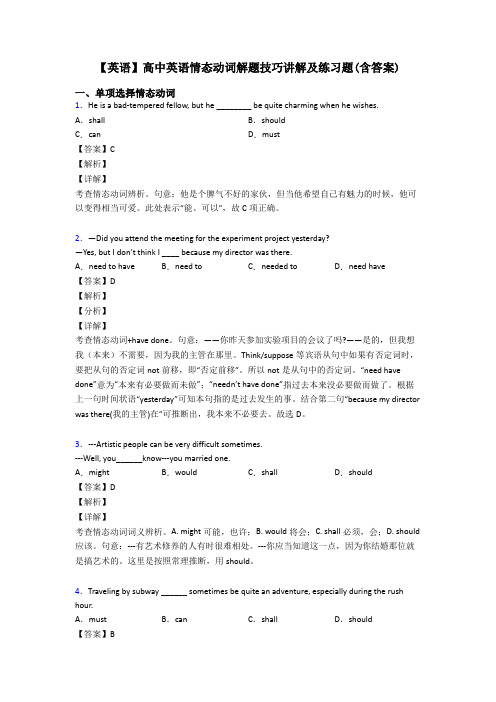
【英语】高中英语情态动词解题技巧讲解及练习题(含答案)一、单项选择情态动词1.He is a bad-tempered fellow, but he ________ be quite charming when he wishes.A.shall B.shouldC.can D.must【答案】C【解析】【详解】考查情态动词辨析。
句意:他是个脾气不好的家伙,但当他希望自己有魅力的时候,他可以变得相当可爱。
此处表示“能、可以”,故C项正确。
2.—Did you attend the meeting for the experiment project yesterday?—Yes, but I don’t think I ____ because my director was there.A.need to have B.need to C.needed to D.need have【答案】D【解析】【分析】【详解】考查情态动词+have done。
句意:——你昨天参加实验项目的会议了吗?——是的,但我想我(本来)不需要,因为我的主管在那里。
Think/suppose等宾语从句中如果有否定词时,要把从句的否定词not前移,即“否定前移”。
所以not是从句中的否定词。
“need have done”意为“本来有必要做而未做”;“needn’t have done”指过去本来没必要做而做了。
根据上一句时间状语“yesterday”可知本句指的是过去发生的事。
结合第二句“because my director was there(我的主管)在”可推断出,我本来不必要去。
故选D。
3.---Artistic people can be very difficult sometimes.---Well, you______know---you married one.A.might B.would C.shall D.should【答案】D【解析】【详解】考查情态动词词义辨析。
高考英语情态动词讲解及习题(附答案)
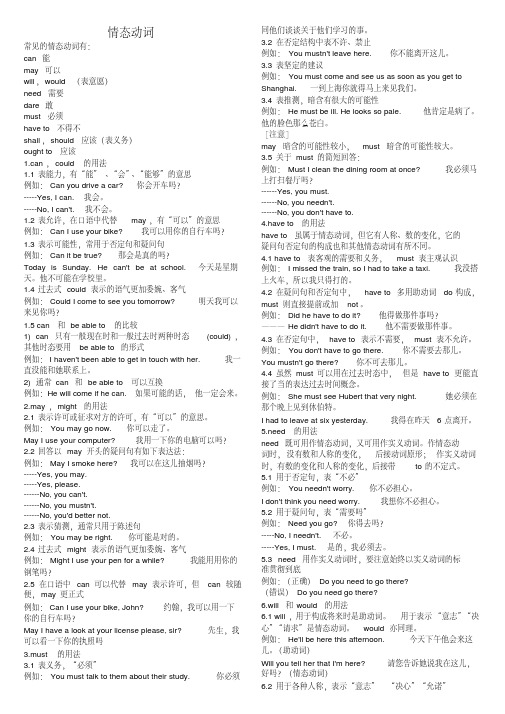
情态动词常见的情态动词有:can 能may 可以will,would (表意愿)need 需要dare 敢must 必须have to 不得不shall,should 应该(表义务)ought to 应该1.can,could 的用法1.1表能力,有“能”、“会”、“能够”的意思例如:Can you drive a car? 你会开车吗?-----Yes, I can. 我会。
-----No, I can't. 我不会。
1.2表允许,在口语中代替may,有“可以”的意思例如:Can I use your bike?我可以用你的自行车吗?1.3表示可能性,常用于否定句和疑问句例如:Can it be true?那会是真的吗?Today is Sunday. He can't be at school.今天是星期天。
他不可能在学校里。
1.4过去式could表示的语气更加委婉、客气例如:Could I come to see you tomorrow?明天我可以来见你吗?1.5 can 和be able to 的比较1) can 只有一般现在时和一般过去时两种时态(could),其他时态要用be able to的形式例如:I haven't been able to get in touch with her.我一直没能和她联系上。
2) 通常can 和be able to 可以互换例如:He will come if he can.如果可能的话,他一定会来。
2.may,might的用法2.1表示许可或征求对方的许可,有“可以”的意思。
例如:You may go now.你可以走了。
May I use your computer?我用一下你的电脑可以吗?2.2回答以may开头的疑问句有如下表达法:例如:May I smoke here? 我可以在这儿抽烟吗?-----Yes, you may.-----Yes, please.------No, you can't.------No, you mustn't.------No, you'd better not.2.3表示猜测,通常只用于陈述句例如:You may be right.你可能是对的。
高考英语新情态动词知识点知识点训练及答案(1)
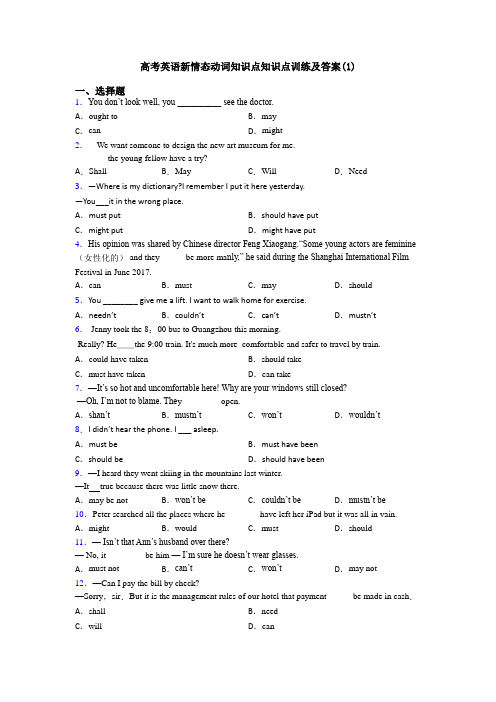
高考英语新情态动词知识点知识点训练及答案(1)一、选择题1.You don’t look well, you __________ see the doctor.A.ought to B.mayC.can D.might2.---We want someone to design the new art museum for me.---_____ the young fellow have a try?A.Shall B.May C.Will D.Need 3.—Where is my dictionary?I remember I put it here yesterday.—You___it in the wrong place.A.must put B.should have putC.might put D.might have put4.His opinion was shared by Chinese director Feng Xiaogang.“Some young actors are feminine (女性化的) and they _____ be more ma nly,” he said during the Shanghai International Film Festival in June 2017.A.can B.must C.may D.should5.You ________ give me a lift. I want to walk home for exercise.A.needn’t B.couldn’t C.can’t D.mustn’t6.-Jenny took the 8:00 bus to Guangzhou this morning.-Really? He__the 9:00 train. It's much more comfortable and safer to travel by train. A.could have taken B.should takeC.must have taken D.can take7.—It’s so hot and uncomfortable here! Why are your windows still closed?—Oh, I’m not to blame. The y ________ open.A.shan’t B.mustn’t C.won’t D.wouldn’t8.I didn’t hear the phone. I ___ asleep.A.must be B.must have beenC.should be D.should have been9.—I heard they went skiing in the mountains last winter.—It true because there was little snow there.A.may be not B.won’t be C.couldn’t be D.mustn’t be 10.Peter searched all the places where he________have left her iPad but it was all in vain. A.might B.would C.must D.should 11.—Isn’t that Ann’s husband over there?— No, it ________ be him —I’m sure he doesn’t wear glasses.A.must not B.can’t C.won’t D.may not 12.—Can I pay the bill by check?—Sorry,sir.But it is the management rules of our hotel that payment _____ be made in cash.A.shall B.needC.will D.can13.Hurry up! Tom _______ for us at the gate.A.must wait B.must be waitingC.can be waiting D.must have waited14.He did not regret saying what he did but felt that he _________ it differently.A.could express B.would expressC.could have expressed D.must have expressed15.—I phoned you yesterd ay morning. A girl answered, but I didn’t recognize the voice.—Oh, it ________ my younger sister. She was in my room at that moment.A.must have been B.should have beenC.could have been D.may have been16.He didn’t follow the doctor’s suggestions as requ ired, but he _________.A.ought B.ought to C.ought to be D.ought to have 17.–Do you know where David is? He is not in the office.–Well, he ______ have gone far—his coat is still here.A.shouldn’t B.mustn’t C.can’t D.wouldn’t18.------ Tom is never late for work. Why is he absent today?------ Something _________ to him.A.must happen B.should have happenedC.could have happened D.must have happened19.Tom told us that he ______ come to the party tonight, but he wasn’t sure about this.A.will B.would C.could D.might20.I _________ my driving test but I didn’t operate carefully.A.should pass B.may passC.might have passed D.might pass21.Word that you _________ enjoy a three-day holiday has come if you do complete the task on time.A.may B.should C.could D.shall22.—Do you know where Tony is?—He _________ in the living room. I saw him there just now.A.shall be B.should have been C.might have been D.must be23.The heavy rain may ______ the landslide last night.A.accounts for B.accounted forC.have accounted for D.accounting for24.You________have scolded him for his poor performance.After all,he had done his best. A.wouldn’t B.couldn’t C.mustn’t D.shouldn’t 25.Skills like critical thinking and analysis ________ be found on the Internet, because they must be acquired in the context of facts.A.can’t B.needn’t C.mustn’t D.shouldn’t【参考答案】***试卷处理标记,请不要删除一、选择题1.A解析:A【解析】【分析】考查情态动词【详解】句意:你看起来不好,你应该去看看医生。
高中英语 情态动词讲解及练习(有答案)

情态动词讲解及练习一、can和could特别说明:(1)could用来表示请求时,语气委婉,主要用于疑问句,不能用于肯定句,答语应用can(即:could不能用于现在时态的简略答语中)。
如:——Could I use your dictionary?——Yes, you can.(否定回答可用:No, I’m afraid not.)(2)can和be able to辨析can(could)和be able to都可以表示能力,意思上没有区别。
但can只有现在式和过去式,而be able to则有更多的形式。
如:I’ve always wanted to able to speak fluent English.Those bags look really heavy, are you sure you’ll be able to carry them on your own?但是,表示在过去某时的某一场合经过一番努力,终于做成了某事,通常不用could,而用was/were able to来表示。
这时,was/were able to相当于managed to do或succeed in doing。
如:After the accident it was a long time before she was able to walk again.The fire was very big, but most people were able to escape from the building.(3) 惯用形式“cannot …too…”表示“无论怎么……也不(过分)”。
如:You cannot be too careful.你越小心越好。
惯用形式“cannot but+ 不定式(不带to)”表示“不得不,只好”。
如:I cannot but admire her determination.我不得不钦佩你的决心。
中学英语情态动词详细用法归纳精华版(含练习及答案)
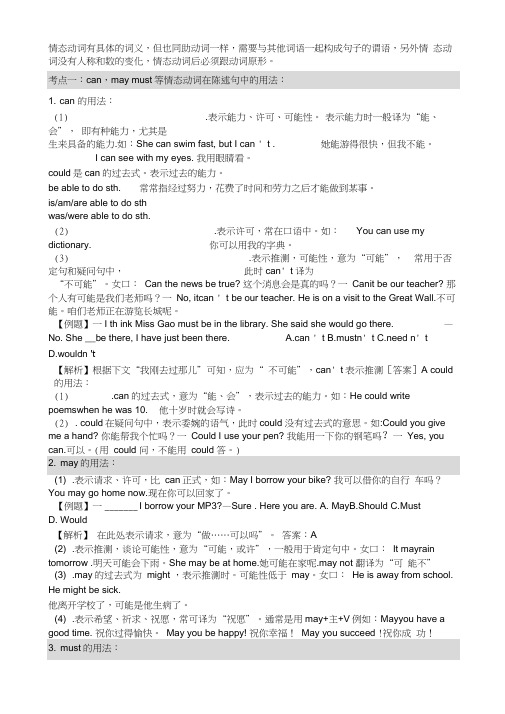
情态动词有具体的词义,但也同助动词一样,需要与其他词语一起构成句子的谓语,另外情态动词没有人称和数的变化,情态动词后必须跟动词原形。
1. can 的用法:(1).表示能力、许可、可能性。
表示能力时一般译为“能、会”,即有种能力,尤其是生来具备的能力.如:She can swim fast, but I can ' t . 她能游得很快,但我不能。
I can see with my eyes. 我用眼睛看。
could是can的过去式。
表示过去的能力。
be able to do sth. 常常指经过努力,花费了时间和劳力之后才能做到某事。
is/am/are able to do sthwas/were able to do sth.(2).表示许可,常在口语中。
如:You can use my dictionary. 你可以用我的字典。
(3).表示推测,可能性,意为“可能”,常用于否定句和疑问句中,此时can' t译为“不可能”。
女口:Can the news be true? 这个消息会是真的吗?一Canit be our teacher? 那个人有可能是我们老师吗?一No, itcan ' t be our teacher. He is on a visit to the Great Wall.不可能。
咱们老师正在游览长城呢。
【例题】一I th ink Miss Gao must be in the library. She said she would go there. —No. She __be there, I have just been there. A.can ' t B.mustn' t C.need n' tD.wouldn 't【解析】根据下文“我刚去过那儿”可知,应为“ 不可能”,can' t表示推测[答案]A could 的用法:(1).can的过去式,意为“能、会”,表示过去的能力。
高中英语情态动词详细讲解及例句

高中英语情态动词详细讲解及例句-CAL-FENGHAI.-(YICAI)-Company One1一、情态动词无人称和数的变化,不能单独做谓语,只能和行为动词或状态动词构成谓语二、情态动词分为:情态助动词:can(could)、may(might)、must、have to (hadto )、ought to 、shall(should)、will(would) 12个半情态助动词:dare、need、used to、had better、would better(5个)三、情态助动词1.can and could1)ability:be able to do /manage to do/succeed in doing sth.eg.The army can defeat their enemy.eg.The army is able to defeat their enemy.eg.The army succeed in defeating their enemy.2)permission:eg.Can I smoke here?eg.You can’t smoke here.3)possibility:用在否定句、疑问句、感叹句中-eg.This can’t be done by him.当被用在肯定句中时,表达的是理论上的可能性,不涉及是否真的会发生eg.even expert drives can make mistakes.要表达现在或者将来的可能性,用may /might或could.eg.I may leave for Beijing next month.但在特殊疑问句中,或与副词hardly、only等连用的陈述句中表达可能性只用can/couldEg.where can the noise be coming from?eg.It can hardly be the postman,he comes only in the morning.4)有时会:the road can be blocked.5)could 表示轻微的怀疑或委婉的看法I’m sorry I couldn’t lend you the book now.His story could be true,but I hardly think it is.6)could 表示委婉的请求,主要用于疑问句,不用于肯定句Could you lend me some money?Yes,I can /No,I am afraid not.7)could 的常用结构:could+动词+比较级“非常,再.....不过了”It couldn’t be better.Couldn’t +过去分词+比较级“非常,再.....不过了”They couldn’t have tried harder to make me eel welcome.Can’t..too..=can never too“无论怎样...也不为过,越...越好”I can’t thank you too much.I owe my progress to you.Can’t (help/choose) but do/can but +动词原形“不得不,只好”We can but agree with him.Can’t help doing 忍不住,不得不I can’t help laughingCan’t be (it) 控制不住,没有办法It can’t be helpedCan’t....without 没有...就不能One can’t succeed without perseverance.2.may and might1)permission:May I use your pen?Yes,you may./No,you may not.2)Possibility:用于推测,表示不确定,不用于疑问句中She may know Tom’s address.出现I’m afraid.I’m not sure等表示不确定时,常用may/might.I’m afraid he might not come to attend the meeting today.从语气上判断,may表示的可能性比might 大,might更多的表示怀疑He may be very busy now.He might be very busy now.3)用于让步状语从句中However hard you may study,you cannot master English in a month.4)用于祈使句,表示祝愿May you succeed!5)might 常用于表示轻微的责备和委婉的请求You might post the letter for me if you are going near a post box.You might have let me know before!6)习惯用法:may as well do”理所当然,有足够的理由”She may be proud of her sonMay /might (just) as well do=had better do(最好)You might as well stay at home tonight.May/might as well+do A+as+do+B”与其做B不如做A”You might as well throw the money away as lend it to him.One may as well not know a thing at all as know it but imperfectly3.must and have to1)表示义务,一定要,必须You must arrive in good time.The meeting is very important.2)表示肯定性或难以避免,必然会,肯定会All men must die.3)must 表示有把握的推测,一定是,准时Must do/must be doing/must have doneThe tall fellow must be a basketball player.Let’s have something.You must be starving.He must have received mu letter which has mailed last week.4)must 表示非要,偏要,常以第二人称为主语,意指不耐或令人不愉快的事情,用于其他人称,表示主语固执,意为偏偏Why must you buy that car?Jane was never a pleasant young girl.After you gave her your advice,she must goand do the opposite.5)must 的三种否定形式表示不可能 must be --can’t be must have done--can’t have doneYou must have met him before.You can’t have met him before.表示不必 must do--need not to/don’t have toWe must get up at six tomorrow morning.We don’t have to get up at six tomorrow morning.表示决不能,严禁 must--mustn’tYou mustn’t park your car here.6)回答以must提问的句子Must we clean all the rooms?Yes ,you must/No ,you don’t have to/No ,you needn’t7)must 可做名词,表示必须有的东西,必须做的事Warm clothes are a must in the mountains.8)must和have to 表示必须时,有一下差别Must 表示的是说话人主观的看法,而have to则往往强调客观需要The play is not interesting ,I really must go now.I have to work when I was your age.Must 一般只表现在,have to 则有更多的时态。
高中英语语法情态动词详解及练习附答案

情态动词一、知识框架二、知识梳理(一)动词分类(二)情态动词基本用法As we all know, an experienced teacher can make mistakes. 众所周知,一位有经验的老师也会犯错。
You mustn’t smoke while you’re walking around in the wood.You could start a fire.情态动词表推测的反意疑问句情态动词表推测的反意疑问句,以情态动词后的时态为淮,如句子里有明确的时间状语,则以其为准。
E.g. 1. You must be hungry now, aren’t you?2. He must be watching TV, isn’t he ?3 Tom must have lived her for a long time, hasn’t he ?4. She must have arrived yesterday, didn’t she?(五)情态动词在if虚拟条件句中的运用三、课堂练习(一)选择1. You ________ give me a lift. I want to walk home for exercise.A.needn’tB.couldn’tC.can’tD.mustn’t2. Remember that in some countries, you ________take flowers of a certain colour, because they’re unlucky.A.could notB.needn’tC.may notD.mustn’t3. —Being young generations in China, _______they take up all of the challenges and opportunities that this country offers?—Absolutely.A. mustn’tB. mightn’tC. shouldn’tD. couldn’t4. —_________you interrupt now? Can’t you see I’m on the phone?—Sorry, sir, but it’s an emergency.A. CanB. ShouldC. MustD. Would5. It is said that people ________ reduce the risk of catching some serious diseases by exercising.A. mustB. canC. wouldD. need6. I was very surprised that that little child __________ have said such rude words to his parents.A. mightB. couldC. wouldD. should7. My phone _________ have been stolen while I was taking a bus. I can’t find it anywhere.A. canB. mustC. shouldD. would8. You ________ so much cash with you, you know — that shop accepted checks.A. couldn’t have takenB. wouldn’t have takenC. shouldn’t have takenD. needn’t have taken9. Without your help, we _________ our task on time. I cannot thank you enough.A. can’t finishB. couldn’t finishC. can’t have finishedD. couldn’t have finished10. —Bob didn’t pass this exam.—What a pity! He _________.A. should study hardB. should have studied hardC. would have studied hardD. could have studied hard(二)填空1. Tom, you __________ leave all your clothes on the floor like this!2. He__________ have completed his work; otherwise, he wouldn’t be enjoying himself by the seaside.3. There __________ be any difficulty about passing the road test since you have practiced a lot in the driving school.4. I __________ have been more than six years old when the accident happened.5. The World Wide Web is sometimes jokingly called the World Wide Wait because it __________ be very slow.6. —Lucy doesn’t mind lending you her dictionary.—She __________. I have already borrowed one.7. I was on the highway when this car went past followed by a police car. They __________(do) at least 150 kilometers an hour.8. We hope that as many people as possible __________ join us for the picnic tomorrow.9. We __________ have proved great adventurers, but we have done the greatest march ever made in the past ten years.10. Some aspects of a pilot’s job __________ be boring, and pilots often __________ work at inconvenient hours.11. — May I smoke here?— If you __________, choose a seat in the smoking section.12. The weather turned out to be fine yesterday. I __________(take)the trouble to carry my umbrella with me.13. — I think I’ll give Bob a ring.— You __________. You haven’t been in touch with him for ages.14.—Is Jack on duty today?—It __________ be him. It’s his turn tomorrow.15. In crowded places like airports and railway stations, you __________ take care of your luggage.16. She looks very happy. She __________ have passed the exam.17. Liza __________ well not want to go on the trip—she hates traveling.18. What a pity! Considering his ability and experience, he __________(do) better.19. Although this __________ sound like a simple task, great care is needed.20. Peter __________ be really difficult at times even though he’s a nice person in general.(三)翻译1.对父母而言,没有什么能与孩子的身心健康相比。
高中英语情态动词讲解与练习(含答案),成才系列

高中英语语法之情态动词(一)情态动词的定义:情态动词表示说话人对某一动作或状态的态度。
(二)情态动词的特点:1)有一定词义;2)不受主语人称和数的变化影响;3)与主要动词的原形(或称不带to的不定式)一起构成谓语(除ought to作固定词组看待)。
情态动词无人称和数的变化, 情态动词后面跟的动词需用原形,否定式构成是在情态动词后面加"not"。
个别情态动词有现在式和过去式两种形式, 过去式用来表达更加客气, 委婉的语气, 时态性不强, 可用于过去,现在或将来。
情态动词属非及物动词,故没有被动语态。
He could be here soon. 他很快就来。
We can't carry the heavy box. 我们搬不动那箱子。
I'm sorry I can't help you. 对不起,我帮不上你。
基本助动词与情态助动词最主要的区别之一是,基本助动词本身没有词义,而情态助动词则有自己的词义,能表示说话人对有关动作或状态的看法,或表示主观设想:What have you been doing since? (构成完成进行体,本身无词义)I am afraid I must be going. (一定要)You may have read some account of the matter. (或许已经)除此之外,情态助动词还有如下词法和句法特征:1)除ought和used以外,其他情态动词后面只能接不带to的不定式。
如果我们把ought to 和used to看做是固定词组的话,那么,所有情态动词无一例外地只能接不带to的不定式:We used to grow beautiful roses.I asked if he would come and repair my television set.2)情态助动词在限定动词词组总是位居第一:They need not have been punished so severely. 3)情态助动词用于第三人称单数现在时的时候,没有词形变化,即其词尾无-s形式:She dare not say what she thinks.4)情态动词没有非限定形式,即没有不定式和分词形式,也没有相应的动名词:Still, she needn't have run away.5)情态助动词的“时”的形式并不是时间区别的主要标志。
完整版英语情态动词用法详解含答案
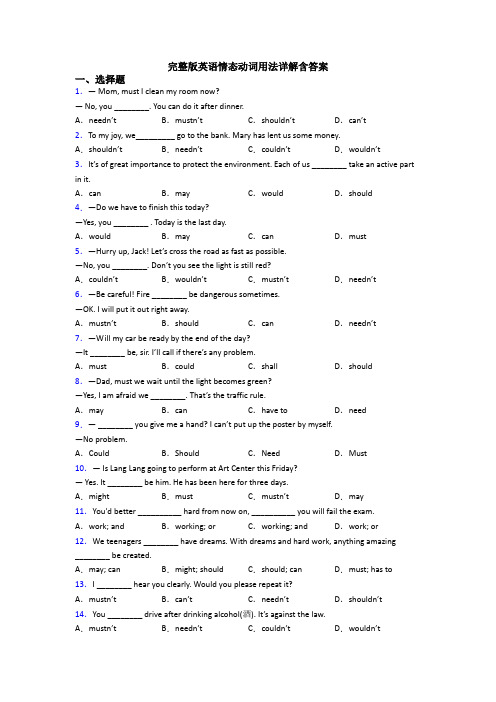
完整版英语情态动词用法详解含答案一、选择题1.— Mom, must I clean my room now?— No, you ________. You can do it after dinner.A.needn’t B.mustn’t C.shouldn’t D.can’t2.To my joy, we_________ go to the bank. Mary has lent us some money.A.shouldn’t B.needn’t C.couldn’t D.would n’t3.It’s of great importance to protect the environment. Each of us ________ take an active part in it.A.can B.may C.would D.should4.—Do we have to finish this today?—Yes, you ________ . Today is the last day.A.would B.may C.can D.must 5.—Hurry up, J ack! Let’s cross the road as fast as possible.—No, you ________. Don’t you see the light is still red?A.couldn’t B.wouldn’t C.mustn’t D.needn’t6.—Be careful! Fire ________ be dangerous sometimes.—OK. I will put it out right away.A.mustn’t B.should C.can D.needn’t 7.—Will my car be ready by the end of the day?—It ________ be, sir. I’ll call if there’s any problem.A.must B.could C.shall D.should 8.—Dad, must we wait until the light becomes green?—Yes, I am afraid we ________. That’s the traffic rule.A.may B.can C.have to D.need9.—________ you give me a hand? I can’t put up the poster by myself.—No problem.A.Could B.Should C.Need D.Must10.— Is Lang Lang going to perform at Art Center this Friday?— Yes. It ________ be him. He has been here for three days.A.might B.must C.mustn’t D.may11.You'd better __________ hard from now on, __________ you will fail the exam. A.work; and B.working; or C.working; and D.work; or 12.We teenagers ________ have dreams. With dreams and hard work, anything amazing________ be created.A.may; can B.might; should C.should; can D.must; has to 13.I ________ hear you clearly. Would you please repeat it?A.mustn’t B.can’t C.needn’t D.shouldn’t 14.You ________ drive after drinking alcohol(酒). It’s against the law.A.mustn’t B.needn’t C.couldn’t D.wouldn’t15.It’s amazing that the pen ________turn voice into text with few mistakes.A.can B.must C.may D.need16.If you buy your mum an iRobot floor cleaner, she ________ sweep the floor every day. A.can’t B.mustn’t C.needn’t D.s houldn’t 17.The boy is very brave.I ________ he ________ the tall tree.A.dare say; dares to climbB.dare to say; dare climbingC.dare saying; dares climbD.dare to say; dares climbed18.—The high school entrance examination is coming!—Yes, our teacher tells us we _______ be too careful while taking exams.A.mustn't B.shouldn't C.needn't D.can't19.---Will you be back early this evening?---Yes, but I ________ be a little late. Our boss sometimes has extra work for us.A.may B.must C.need D.will20.We’ve d iscussed every detail of this plan and have got everything ready. But still something __________ go wrong. We still have to be very careful.A.must B.should C.would D.may21.You ______ pay too much attention to your pronunciation, as it is so important in the oral (口头的) test.A.shouldn’t B.mustn’t C.can’t D.needn’t 22.—Will your mother be at home this Saturday?—Hard to say. She _______go to the countryside to see my grandparents.A.must B.may C.can D.would 23.Think twice before making a decision, or you __________ get into trouble.A.may B.can't C.shouldn't D.mustn't 24.Don’t cross the road until the traffic lights turn green. A car_______hit you.A.need B.may C.should D.must 25.—Where is Tom? I am considering ________ him about the result of the exam.—Oh. You ________. He has known it already.A.to tell; can't B.telling; needn't C.tell; mustn't D.told; shouldn't 26.—Will Jim come to Yangzhou for a holiday?—He ________come and it depends on how much homework he will have.A.may B.should C.must D.need27.Hurry up, or we ________ miss the beginning of the film.A.should B.must C.may D.have to 28.—How do you like my new dress?—Well, if I ________ say, it is not suitable for you.A.may B.must C.have to D.should29.—Must the children leave at six tomorrow morning?—No, they _______. They can have more time to get ready for the trip.A.can’t B.needn’t C.mustn’t D.may not 30.—Why didn’t you tell it to me earlier?— Why ________ I? I want to have my own secret.A.can B.may C.should D.shall31.A hard-working man ________ become a great scientist, but a great scientist ________ be a hard-working man.A.can’t; can B.may not; must C.can’t; must D.may not; can 32.—What is that young lady’s job?—She ________ be a nurse, I’m not sure.A.must B.may C.need D.would 33.According to the rule, used batteries ________ be dropped in the red bin for harmful wastes. A.may B.would C.should D.might34.You _________ smoke here! Look at the sign. It says "No smoking".A.needn't B.mustn't C.can D.may35.—Suzy described every detail of the accident just now.—Her memory ________ be completely back.A.shall B.need C.must D.could36.—Is that Mr Zhou?—It ________ be him. He has gone to Beijing.A.can B.may C.can’t D.shouldn’t 37.—Who’s singing next door? Is it Miss Wang?—It ________ be h er. She’s having the board meeting.A.can’t B.shouldn’t C.mustn’t D.needn’t38.— Mum, why do I have to wash hands so many times a day?—You ________ be too careful, for your health.A.can’t B.mustn’t C.may not D.needn’t39.To avoid ________, we’d better ________ the parents’ meeting online.A.gather; hold B.gathering; hold C.gather; holding D.to gather; to hold 40.I think all the students love the weekends because, to them, they ________ get up early on Saturdays or Sundays.A.mustn’t B.don’t need C.needn’t D.can’t41.—Is it usually warm in Yancheng in May?—Yes. But it _______ be rather cold sometimes.A.must B.should C.would D.can42.—Shall I tell him the change of the time right now?—I’m afraid you ________, otherwise he will be late for the meeting.A.can B.may C.must D.need43.—Will dad arrive home at 6 o’clock to have dinner with us this evening?— I think he will, but he ________ not. Sometimes he works extra hours.A.can B.must C.need D.may 44.—Excuse me. I haven’t finished reading the book yet. M ay I keep it a bit longer?— Sorry, you ________. You must return it on time.A.needn’t B.can’t C.won’t D.shouldn’t 45.Cars ________ give way to walkers on some roads in Binhai, or the drivers will be fined. A.may B.will C.can D.must 46.Sometimes smiles ________ be false, hiding other feelings like anger, fear or worry. A.should B.would C.must D.can 47.—Could you tell me how to renew the library books?—With pleasure. You ________ come to our desk every time. It’s easier to renew them online. A.can’t B.must n’t C.needn’t D.shouldn’t 48.—The article says that a person’s animal sign decides his personality.—You ________ read it for fun, but don’t believe in that.A.can B.must C.shouldn’t D.needn’t49.— What do you think of the show yesterday?— Some of them were really good but others ________ be better.A.will B.must C.need D.can50.Never throw objects from the building. Even a small object ________ cause serious injuries, or death, when dropped from a great height.A.must B.should C.may D.need【参考答案】***试卷处理标记,请不要删除一、选择题1.A解析:A【详解】句意:——妈妈,我现在必须打扫房间吗?——不,不需要。
- 1、下载文档前请自行甄别文档内容的完整性,平台不提供额外的编辑、内容补充、找答案等附加服务。
- 2、"仅部分预览"的文档,不可在线预览部分如存在完整性等问题,可反馈申请退款(可完整预览的文档不适用该条件!)。
- 3、如文档侵犯您的权益,请联系客服反馈,我们会尽快为您处理(人工客服工作时间:9:00-18:30)。
We used to grow beautiful roses. I asked if he would come and repair my television set. 2情态助动词在限定动词词组总是位居第一: They need not have been punished so severely. 3 情态助动词用于第三人称单数现在时的时候,没有词形变化,即其词尾无-s 形式: She dare not say what she thinks. 4 情态动词没有非限定形式,即没有不定式和分词形式,也没有相应的动名词: Still, she needn't have run away. 5 情态助动词的“时”的形式并不是时间区别的主要标志。在不少场合,情态助动词的现在 时和过去时形式都可以表示现在、过去或将来时间: Would you mind very much if I ask you to do something? She told him he ought not to have done it. 6情态助动词之间是相互排斥的,即在一个限定动词词组中只能出现一个情态助动词,但有时 却可以与 have 和 be 基本助动词连用: You should have washed the wound. Well, you shouldn't be reading a novel. (三)情态动词有四类:①只做情态动词:must,can(could),may(might),ought to ②可做情态 动词又可做实义动词:need,dare ③可做情态动词又可做助动词:shall(should),will(would)
3 表示允许。 Can I have a look at your new pen? 我可以看一看你的新钢笔吗? He asked whether he could take the book out of the reading—room. 他问他可不可以把书带出阅览室。
4 表惊异、怀疑、不相信等态度。主要用于否定句、疑问句或感叹句中。 Where can (could) they have gone to? 他们会去哪儿了呢? He can´t (couldn´t) be over sixty. 他不可能超过六十岁。 How can you be so careless? 你怎么这么粗心?
④具有情态动词特征:have(had,has) to,us1. can (could) 1) 表示能力,could 主要指过去时间。 Two eyes can see more than one. 两只眼比一只眼看得清。 Could the girl read before she went to school? 这女孩上学前能识字吗? 2) 表示可能(理论上或是逻辑判断上)。 The temperature can fall to –60℃, that is 60℃ below freezing. 气温可降至—60℃,也就是零下 60℃。
- 1-
He can´t (couldn´t) have enough money for a new car. 他不可能有足够的钱买新车。 You mustn´t smoke while you´re walking around in the wood. You could start a fire. 在林子里走时勿吸烟,那样可能会引起火灾。
基本助动词与情态助动词最主要的区别之一是,基本助动词本身没有词义,而情态助动词则 有自己的词义,能表示说话人对有关动作或状态的看法,或表示主观设想: What have you been doing since? (构成完成进行体,本身无词义) I am afraid I must be going. (一定要) You may have read some account of the matter. (或许已经) 除此之外,情态助动词还有如下词法和句法特征: 1除 ought 和 used 以外,其他情态动词后面只能接不带 to 的不定式。如果我们把 ought to 和 used to 看做是固定词组的话,那么,所有情态动词无一例外地只能接不带 to 的不定式:
高中英语语法之情态动词
(一)情态动词的定义 :情态动词表示说话人对某一动作或状态的态度。 (二)情态动词的特点 :1)有一定词义;2)不受主语人称和数的变化影响;3)与主要动 词的原形(或称不带 to 的不定式)一起构成谓语(除 ought to 作固定词组看待)。 情态动词无人称和数的变化, 情态动词后面跟的动词需用原形,否定式构成是在情态动词后面 加 "not"。 个别情态动词有现在式和过去式两种形式, 过去式用来表达更加客气, 委婉的语气, 时态性不强, 可用于过去,现在或将来。情态动词属非及物动词,故没有被动语态。 He could be here soon. 他很快就来。 We can't carry the heavy box. 我们搬不动那箱子。 I'm sorry I can't help you. 对不起,我帮不上你。
